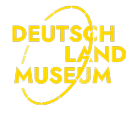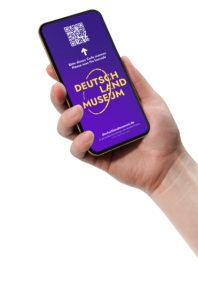Epoch weeks
Epoch Week 1
Germanic Peoples – 9 A.D.
The term “Germans” was coined by the Romans, as a label for all Germanic speaking people who settled in Central and Northern Europe. The Germanic peoples were not a coherent group of people but many independent tribes.
They lived in small settlements made of half-timbered and clay houses. One tribe comprised several such settlements. The Germanic peoples did not have cities or an own currency.
Embark on a journey through 2,000 years of German history. One country, 12 epochs. You’re invited to experience the Epoch Weeks at the Deutschlandmuseum. Every week we showcase an epoch that is also on display in the Deutschlandmuseum.
Epoch Week 2
Early Middle Ages
The period between the fall of the Western Roman Empire 476 BC and the end of the Ottonian reign 1024 BC is considered the Early Middle Ages.
During this time, Europe changed significantly. New realms under the reign of Germanic peoples became the foundation for some of today’s European states.
Embark on a journey through 2,000 years of German history. One country, 12 epochs. You’re invited to experience the Epoch Weeks at the Deutschlandmuseum. Every week we showcase an epoch that is also on display in the Deutschlandmuseum.
Epoch Week 3
High Middle Ages
During the High and Late Middle Ages, knights & castles flourished. The Holy Roman Empire comprised big parts of Central Europe and Northern Italy.
Many people associate dark times and rigid hierarchies with the middle ages, but the period was also marked by important social and economic novelties.
Embark on a journey through 2,000 years of German history. One country, 12 epochs. You’re invited to experience the Epoch Weeks at the Deutschlandmuseum. Every week we showcase an epoch that is also on display in the Deutschlandmuseum.
Epoch Week 4
The Reformation
During the 16th century, many critics accused the Catholic Church of exploiting the faithful for its own riches and wanting to expand its power.
Due to the invention of the printing press, this criticiscm spread fast.
The protestant reformation led to the division of the Catholic Church and many violent conflicts as a result.
Embark on a journey through 2,000 years of German history. One country, 12 epochs. You’re invited to experience the Epoch Weeks at the Deutschlandmuseum. Every week we showcase an epoch that is also on display in the Deutschlandmuseum.
Epoch Week 5
The Enlightenment
During the age of enlightenment, fundamentals of human thinking changed, thereby also influencing society.
Up until then, traditional religious doctrines and resulting social standards were widely accepted.
Now, people started relying on their own reason and challenged old standards. Today’s human rights and citizen rights emerged from this new approach.
Embark on a journey through 2,000 years of German history. One country, 12 epochs. You’re invited to experience the Epoch Weeks at the Deutschlandmuseum. Every week we showcase an epoch that is also on display in the Deutschlandmuseum.
Epoch Week 6
The German Confederation
The 19th century ended old political orders like the Holy Roman Empire and new structures like the German Confederation emerged.
The German people demanded more political involvement from the duchies. A revolution started but failed.
Imperial Germany eventually became the first German nation state.
Embark on a journey through 2,000 years of German history. One country, 12 epochs. You’re invited to experience the Epoch Weeks at the Deutschlandmuseum. Every week we showcase an epoch that is also on display in the Deutschlandmuseum.
Epoch Week 7
Imperial Germany
Imperial Germany was the first ever German nation state. Within just a few decades it evolved into Europe’s most impactful industrial nation.
Under the rule of Emperor William II. the empire’s international impact was supposed to be expanded through colony ownership and a strong military.
The rivalry with other great powers led to the outbreak of the First World War.
Embark on a journey through 2,000 years of German history. One country, 12 epochs. You’re invited to experience the Epoch Weeks at the Deutschlandmuseum. Every week we showcase an epoch that is also on display in the Deutschlandmuseum.
Epoch Week 8
The Weimar Republic
During the Weimar Republic, the first German democracy saw ups and downs.
After years of crisis, culture flourished during the “golden twenties”.
The global economic crisis ended the high times in 1929. With the rise of national socialism the Weimar Republic soon came to an end.
Embark on a journey through 2,000 years of German history. One country, 12 epochs. You’re invited to experience the Epoch Weeks at the Deutschlandmuseum. Every week we showcase an epoch that is also on display in the Deutschlandmuseum.
Epoch Week 9
The Third Reich
Without a doubt, the Third Reich is the darkest chapter of German history.
In 1933, National Socialists led by Adolf Hitler established a dictatorship with racist ideology in Germany.
They led the country into the Second World War and committed multiple genocides.
Embark on a journey through 2,000 years of German history. One country, 12 epochs. You’re invited to experience the Epoch Weeks at the Deutschlandmuseum. Every week we showcase an epoch that is also on display in the Deutschlandmuseum.
Epoch Week 10
The division of Germany
After the Second World War many German cities were destroyed and Germany occupied by the victorious powers.
Two politically and economically entirely different German states emerged from the occupation zones.
Soon the west German economic miracle provided a new quality of life that led an increasing amount of people to leave the GDR for the West.
Embark on a journey through 2,000 years of German history. One country, 12 epochs. You’re invited to experience the Epoch Weeks at the Deutschlandmuseum. Every week we showcase an epoch that is also on display in the Deutschlandmuseum.
Epoch Week 11
The two Germanies
The building of the German wall in 1961 destroyed all remaining hopes for a quick German reunification.
Only under Chancellor Willy Brandt the FRG and GDR started moving closer politically.
Changes in social and global politics repeatedly proved to be big challenges for the political landscape in Eastern and Western Germany.
Embark on a journey through 2,000 years of German history. One country, 12 epochs. You’re invited to experience the Epoch Weeks at the Deutschlandmuseum. Every week we showcase an epoch that is also on display in the Deutschlandmuseum.
Epoch Week 12
German reunification
The peaceful revolution by citizens of the GDR led to the fall of the Berlin Wall in 1989 and paved the way for reunification of the two German states.
The capital city Berlin with its diverse culture and big events like the football world championship 2006 have since changed the face of Germany.
Yet various crises also make up the most recent German history.
Embark on a journey through 2,000 years of German history. One country, 12 epochs. You’re invited to experience the Epoch Weeks at the Deutschlandmuseum. Every week we showcase an epoch that is also on display in the Deutschlandmuseum.
Knowledge is just one click away
Embark on a journey through 2,000 years of German history. One country, 12 epochs. You’re invited to experience the Epoch Weeks at the Deutschlandmuseum. Every week we showcase an epoch that is also on display in the Deutschlandmuseum.

